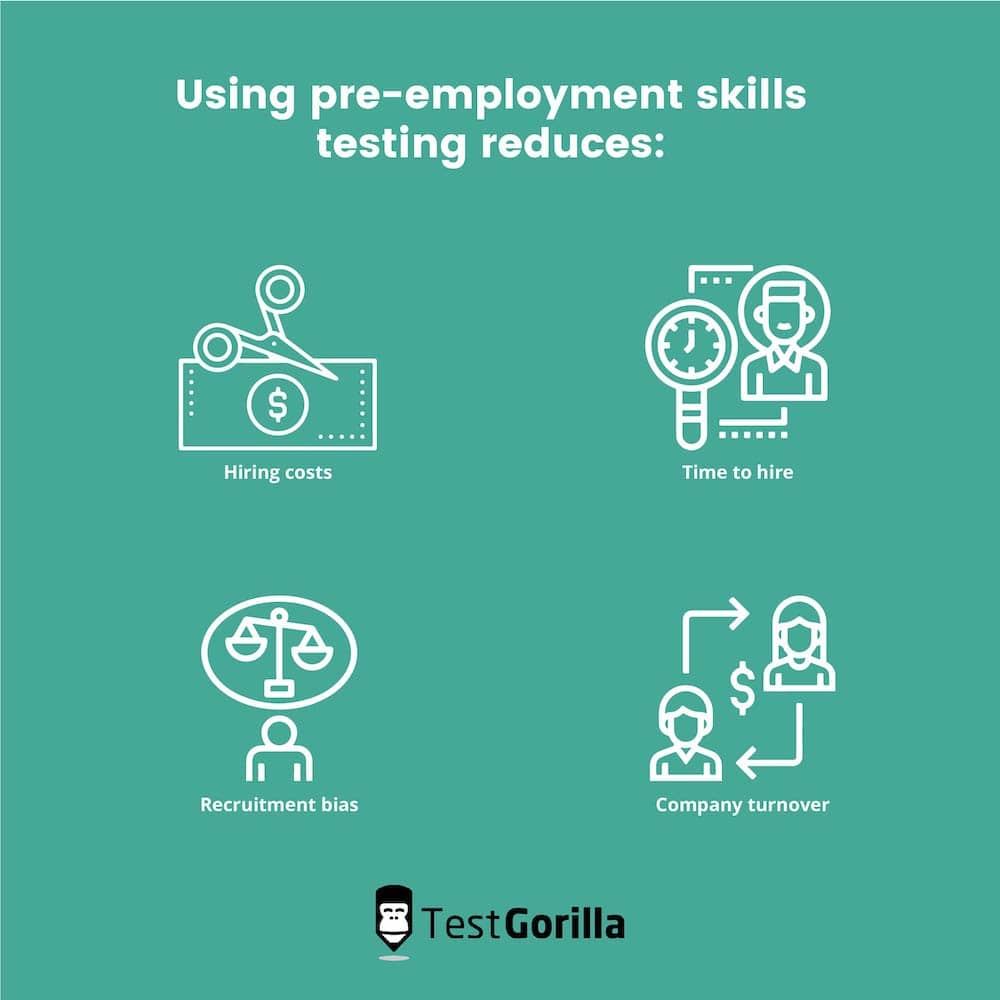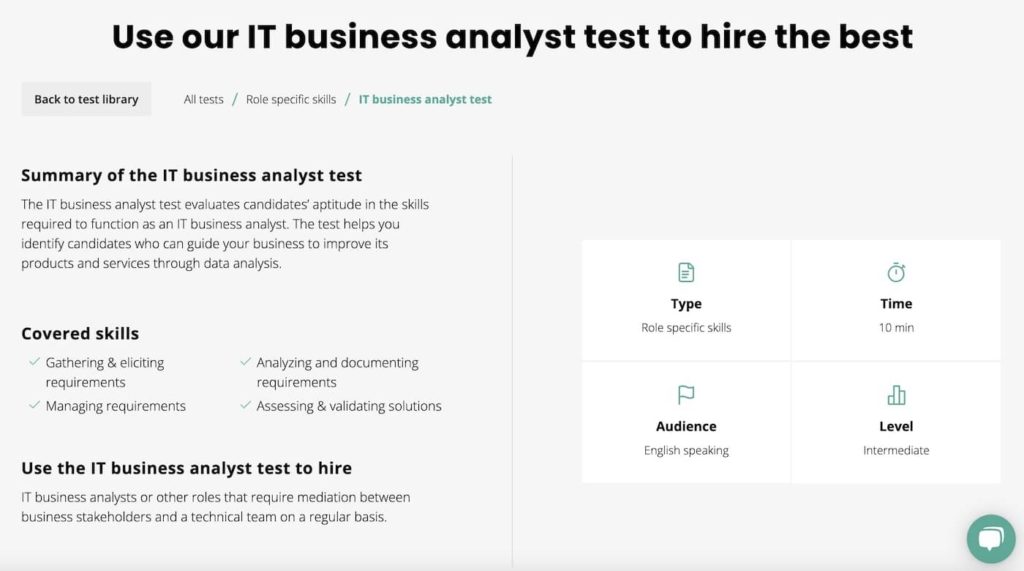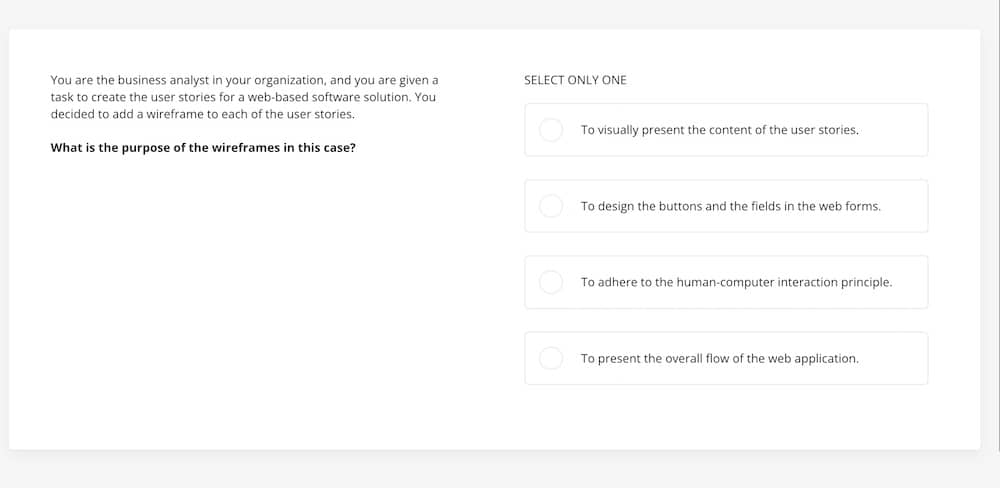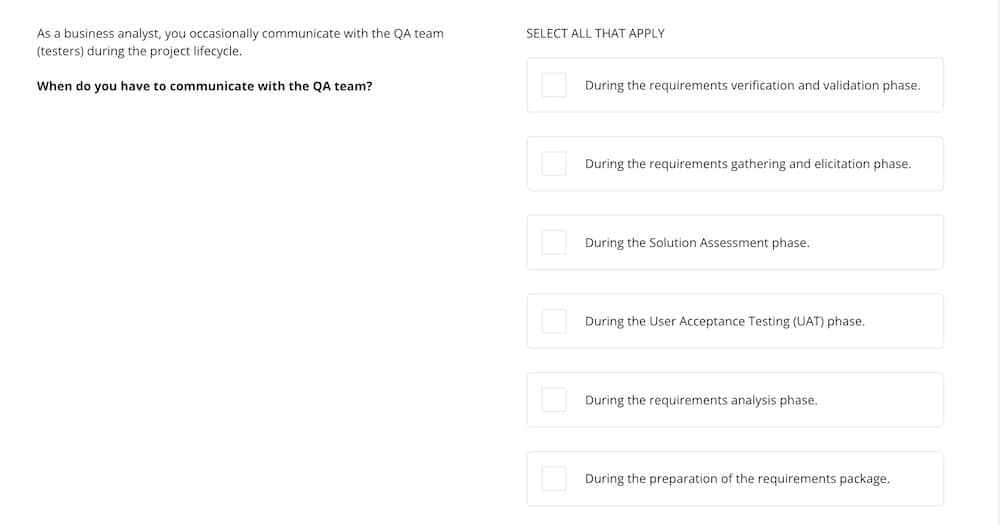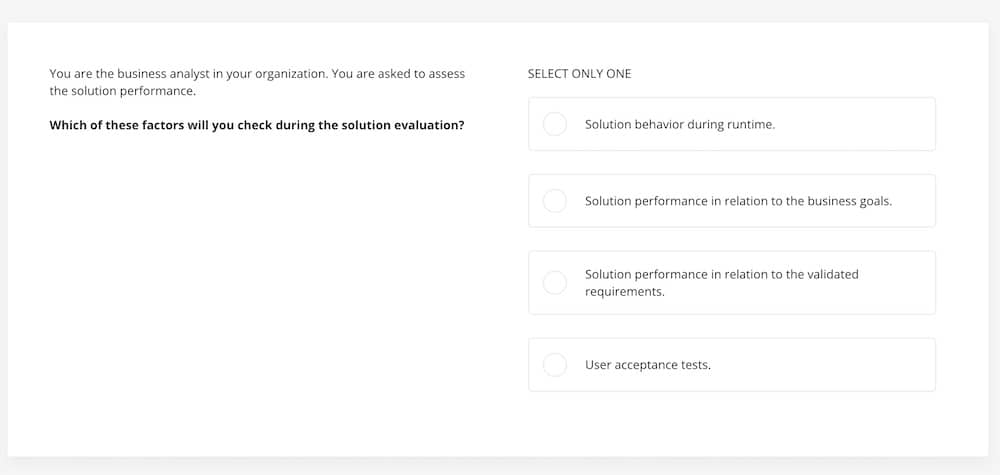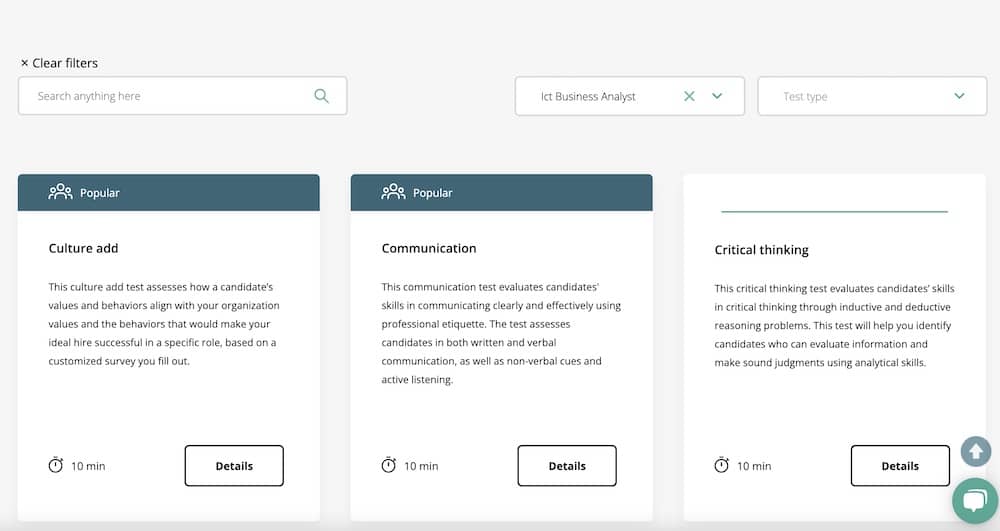Table of contents
Business and technology skills are converging as businesses become increasingly technology and data-driven. IT business analysts straddle the line between business analytics and IT deployment, so their role captures this convergence.
Because of this, hiring an IT business analyst can be a vital move for businesses and organizations across industries. And pre-employment skills assessments are the most reliable way for them to hire the best candidate for the job. We’re here to tell you why, and how. But before we start, it’s worth noting that IT business analysts can also be referred to as:
Systems analysts
Data analysts
IT analysts
ICT business analysts
IT consultants
Requirements engineers
Here’s everything you need to know about testing IT business analyst skills in candidates.
In this blog post
Why use skills assessments?
The stakes for hiring are higher than you might realize: according to the US Department of Labor, a bad hire can cost up to 30% of the employee’s first-year earnings. There are consequences for company culture and team morale, too, which make the real cost hard to calculate.
Because an IT business analyst plays such an important role in optimizing business capabilities, a bad hire will likely be more costly than it is for other roles.
Luckily, there are several things you can do to reduce your chances of hiring the wrong person for the job.
Advertise effectively
First and foremost, you should write a job posting that is compelling and informative enough to effectively attract the right candidates. If you want to know how to do this, there’s a breakdown in our guide to effective job posting. We’ve got a job description template to help, too.
Once you’ve advertised effectively, you should be attracting candidates who have relevant skills and experience. And since you can’t offer them all the job, you’ll want to interview a shortlist.
Shortlist candidates without bias and stress using pre-employment testing
Assessing candidates can be challenging, but the best step you can take to narrow down your applicants is to send them a pre-employment skills assessment.
Recruitment teams and hiring managers use the results of pre-employment assessments to make data-driven, reliable, streamlined decisions about who to shortlist. The chances of a bad hire are dramatically reduced and unconscious bias is removed from the employment process.
The pros of using skills assessments become even more clear when we consider the cons of the alternative: CVs and resumes. They provide no common standard, leading to baseless judgments between candidates, and they focus on experience and education, which are unreliable indicators of a new hire’s performance or success. They leave the hiring process wide open to certain forms of recruitment bias, and often contain inflated information: over half of UK adults admit to lying on their CV.
In a nutshell, using pre-employment skills testing reduces:
Hiring costs
Time to hire
Recruitment bias
Company turnover
For a specialist role like an IT business analyst, skills testing is a must. Send your candidates a skills assessment, and you’ll have the data you need to establish a shortlist in no time. The rest is a piece of cake: evaluate the results, interview your shortlisted candidates, and hire the best.
Now you’ve heard the case for skills assessments, let’s move on and explore which skills you should be looking out for in IT business analyst candidates
Top skills to look for in IT business analyst candidates
The IT business analyst skillset spans the realms of IT and business analytics, administration, and management. It’s a broad set, and successful IT business analysts also need excellent soft skills, such as communication and organization.
Problem-solving
Identifying problems and thinking analytically to find solutions to them is the basis of any business analyst’s job. They work with requirements, determining them first and then compiling data-driven reports and plans for an organization’s executives and stakeholders. Because of this, problem-solving skills are crucial to the role.
Critical thinking
The best IT business analysts will be critical thinkers. This skill entails analyzing all available facts, information, and arguments in order to reach a judgment. Since IT business analysts are responsible for making the final call on plans, often in the face of varying stakeholder priorities, critical thinking skills will be a skill to look out for in candidates.
Data analysis
Technical requirements can be reliably determined through thorough data analysis, and so inadequate data analysis might lead to oversights that result in inaccurately extracted requirements or bad requirement prioritization. Your best candidates will be competent data analysts and will be able to interpret data to come up with effective and creative solutions.
IT knowledge
The best IT business analysts have a strong knowledge base in relation to both business and IT. In order for them to effectively bridge the gap between the two in your business, candidates will need to have this skill and use it to fill in the gaps for others as needed.
Communication
IT business analysts are responsible for channeling information from technical teams to business stakeholders. Such information might vary in complexity or importance, but effective communication is always necessary to keep the cogs of a business turning smoothly. Hire candidates who can translate technical complexities into a language business stakeholders can grasp.
Management and leadership
Managing and implementing changes is also part of the job. Candidates with good leadership qualities are likely to be able to do this well. It can take confidence and a bit of charm as well as effective communication to motivate and unite a team behind an idea for change and its processes.
The IT business analyst test
Because it needs to cover such a broad skillset, IT business analyst testing requires test material that is crafted to fit the IT business analyst role.
In light of this, TestGorilla’s IT business analyst test is specifically designed to assess candidates’ proficiency in the skills needed for the role. Crafted with the knowledge of subject-matter experts, the test will give applicants the chance to show you how well they’d perform in the role.
IT business analyst testing will help you evaluate the following skills in candidates:
Gathering and eliciting requirements
Managing requirements
Analyzing and documenting requirements
Assessing and validating solutions
How does it work?
The test presents candidates with different IT analysis scenarios. They are asked to analyze the information they’re given in the question and identify the best answer.
Questions refer to the overall skillset. So, candidates who score highly on the test can effectively handle requirement analysis and management. They are also able to recommend suitable solutions for common business environment encounters.
Below are some examples of what these questions might look like. Each involves a scenario that might be faced by an IT business analyst.
Example questions
This question is testing candidates’ knowledge of wireframes, something they’d need to know about for the role.
This question tests candidates’ awareness of the communication etiquette that IT business analysts need to adhere to.
Here, candidates are being assessed on their knowledge of the solution evaluation process, which is another vital part of the role.
Related tests
Although the IT business analyst skills test is reliable and comprehensive, you shouldn’t be evaluating your candidates based on the results of this test alone. A complete pre-employment assessment will include several tests and custom questions so that you can get a multi-dimensional overview of your candidates, their skillsets, and their personalities.
Role-specific skills are important, but they aren’t everything. It’s also beneficial to test for relevant cognitive abilities. If the role advertised deals with clients who speak another language, then you should be using language tests, too. And if you want to understand more about how candidates think, behave and motivate themselves, then you can use personality and culture tests.
You can search for any role in our test library to discover related tests. But, since you’re here now, we’ve assembled a selection of other tests below that you can use to identify the right IT business analyst for your company.
Problem-solving test
Test type: Cognitive ability.
Covered skills: creating and adjusting schedules, interpreting data and applying logic to make decisions, prioritizing and applying order based on a given set of rules, analyzing textual and numerical information to draw conclusions.
Numerical reasoning test
Test type: Cognitive ability.
Covered skills: interpreting numbers, fractions, and percentages, understanding number patterns, interpreting text and tables, interpreting charts, graphs, and diagrams.
Communication test
Test type: Situational judgment.
Covered skills: understanding and interpreting written communication, listening actively and interpreting non-verbal cues, clarifying next steps, and summarizing messages effectively using professional communication etiquette.
Big 5 (OCEAN) test
Test type: Personality and culture.
Determines: the test-taker’s position on each of five factors – openness, conscientiousness, extraversion, agreeableness, and neuroticism – to provide insight into their strengths and opportunities for improvement.
Working with data test
Test type: Role-specific skills.
Covered skills: understanding data handling concepts, performing basic data analysis and interpretation, working with graphs and charts.
Culture add test
Test type: Personality and culture.
Determines: how a candidate’s values and behaviors align with your organization’s values and ideal behaviors based on a customized survey you both fill out.
Motivation test
Test type: Personality and culture.
Determines: how well-aligned candidates’ preferences are with the job you are offering based on a customized survey you both fill out.
Business ethics & compliance test
Test type: Situational judgment.
Covered skills: Understanding and avoiding conflicts of interest, understanding policy and legal violations, understanding the impact of ethical issues on a business or political reputation, anti-harassment and anti-disciplinary policies.
Final steps for IT business analyst recruitment
By this stage, you’ll know how to test IT business analyst skills in your candidates, with the added bonus of knowing the top skills to look out for and which related tests you can use.
The final stages of your recruitment process will look a bit like this:
Evaluate candidates based on their assessment results and their answers to any custom questions
Shortlist the best and invite them to interview in-person or remotely
Conduct interviews. You can use our 40 interview questions for IT business analysts and our guide to video interviewing if your interviews are happening remotely
Send the best candidate a job offer
By implementing skills testing in your hiring process, you’re ensuring your chosen candidate is a great match for the role and for your company and vice versa.
Join TestGorilla today to start your journey with skills-based hiring.
Related posts
Hire the best candidates with TestGorilla
Create pre-employment assessments in minutes to screen candidates, save time, and hire the best talent.
Latest posts
The best advice in pre-employment testing, in your inbox.
No spam. Unsubscribe at any time.

Hire the best. No bias. No stress.
Our screening tests identify the best candidates and make your hiring decisions faster, easier, and bias-free.
Free resources
This checklist covers key features you should look for when choosing a skills testing platform
This resource will help you develop an onboarding checklist for new hires.
How to assess your candidates' attention to detail.
Learn how to get human resources certified through HRCI or SHRM.
Learn how you can improve the level of talent at your company.
Learn how CapitalT reduced hiring bias with online skills assessments.
Learn how to make the resume process more efficient and more effective.
Improve your hiring strategy with these 7 critical recruitment metrics.
Learn how Sukhi decreased time spent reviewing resumes by 83%!
Hire more efficiently with these hacks that 99% of recruiters aren't using.
Make a business case for diversity and inclusion initiatives with this data.

